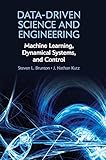Data-driven science and engineering : machine learning, dynamical systems, and control Steven L. Brunton, J. Nathan Kutz
Material type: TextPublication details: New York, NY : Cambridge University Press, 2019. ©2019Description: 472PISBN:
TextPublication details: New York, NY : Cambridge University Press, 2019. ©2019Description: 472PISBN: - 9781108422093
- 620.002 BRU
| Item type | Current library | Collection | Call number | Status | Date due | Barcode |
|---|---|---|---|---|---|---|
 Books
Books
|
IIITDM Kurnool General Stacks | 620.002 BRU (Browse shelf(Opens below)) | Checked out | 15.12.2025 | 0004614 | |
 Books
Books
|
IIITDM Kurnool General Stacks | Non-fiction | 620.002 BRU (Browse shelf(Opens below)) | Available | 0004605 | |
 Books
Books
|
IIITDM Kurnool General Stacks | Non-fiction | 620.002 BRU (Browse shelf(Opens below)) | Checked out | 28.01.2025 | 0004606 |
 Books
Books
|
IIITDM Kurnool General Stacks | Non-fiction | 620.002 BRU (Browse shelf(Opens below)) | Checked out | 01.12.2025 | 0004607 |
 Reference
Reference
|
IIITDM Kurnool Reference | Reference | 620.002 BRU (Browse shelf(Opens below)) | Not For Loan | 0004608 |
Browsing IIITDM Kurnool shelves, Shelving location: General Stacks, Collection: Non-fiction Close shelf browser (Hides shelf browser)

|

|

|

|

|

|

|
||
| 620.0015 MOI Fundamentals of engineering numerical analysis | 620.002 BRU Data-driven science and engineering : | 620.002 BRU Data-driven science and engineering : | 620.002 BRU Data-driven science and engineering : | 620.002 PAT Programming in MATLAB: A Problem solving approach | 620.002 PAT Programming in MATLAB: A Problem solving approach | 620.002 PAT Programming in MATLAB: A Problem solving approach |
Part I --
Dimensionality Reduction and Transforms - Part II --
Machine Learning and Data Analysis Part III --
Dynamics and Control - Part IV --
Reduced Order Models -
Data-driven discovery is revolutionizing the modeling, prediction, and control of complex systems. This textbook brings together machine learning, engineering mathematics, and mathematical physics to integrate modeling and control of dynamical systems with modern methods in data science. It highlights many of the recent advances in scientific computing that enable data-driven methods to be applied to a diverse range of complex systems, such as turbulence, the brain, climate, epidemiology, finance, robotics, and autonomy. Aimed at advanced undergraduate and beginning graduate students in the engineering and physical sciences, the text presents a range of topics and methods from introductory to state of the art


There are no comments on this title.